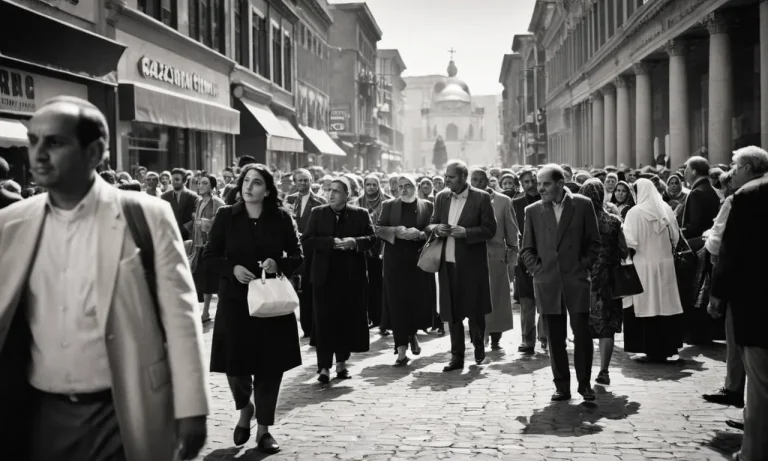What Does The Bible Say About Uncertainty?
Uncertainty is an inescapable part of the human experience. Whether due to difficult circumstances, anxiety about the future, or a crisis of faith, we all face times of doubt and uncertainty. In those moments, many find comfort and wisdom in biblical teachings about uncertainty.
If you’re short on time, here’s a quick answer to your question: The Bible acknowledges that uncertainty is part of life and encourages believers to respond with faith, hope, love, and trust in God’s sovereignty and goodness.
In this comprehensive article, we will explore numerous biblical passages that provide perspective on living with uncertainty. We will examine God’s promises to be with us in uncertain times, biblical figures who modeled faith in the face of the unknown, and scriptural wisdom for finding peace and direction when the future is unclear.
God’s Presence and Promises in Uncertainty
God’s Reassuring Presence
In times of uncertainty, it can be incredibly comforting to know that God is always present with us (Psalm 139:7-12). Though we cannot physically see or touch God, we can be assured of His spiritual presence through faith.
God has promised to never leave us nor forsake us (Deuteronomy 31:6), so we do not have to feel alone even in difficult times. Trusting in God’s constant presence can give us strength, hope and peace when facing the unknown.
Some ways we can become more aware of God’s presence include praying, reading Scripture, singing worship songs, attending church, and spending time in nature. As we draw near to God, He has promised to draw near to us (James 4:8).
Experiencing God’s nearness helps reassure us that we are not facing uncertainty by ourselves.
Trusting God’s Plan and Purposes
It can be challenging to trust God’s plan when we cannot see what lies ahead. However, the Bible reminds us that God’s ways and thoughts are higher than our own (Isaiah 55:8-9). He sees the full picture while we see only a small part of it.
We may not understand all God is doing, but we can trust in His goodness, wisdom and sovereignty.
Romans 8:28 promises that in all things, God is working for the good of those who love Him. Even when we cannot see how, God can use difficult circumstances to accomplish His purposes in our lives and bring blessing out of them.
As we yield our lives to God’s plan instead of our own, He will direct our paths (Proverbs 3:5-6). Surrendering our will to His brings peace and confidence despite uncertainty about the future.
Hope and Comfort in God’s Promises
One way God brings reassurance in uncertain times is through His many great promises in Scripture. Here are just a few examples of promises that can give us hope and comfort:
- God promises to provide for all our needs: “And my God will supply every need of yours according to his riches in glory in Christ Jesus.” (Philippians 4:19)
- God promises everlasting life for those who believe in Jesus: “For God so loved the world, that he gave his only Son, that whoever believes in him should not perish but have eternal life.” (John 3:16)
- Jesus promises His peace: “Peace I leave with you; my peace I give to you. Not as the world gives do I give to you. Let not your hearts be troubled, neither let them be afraid.” (John 14:27)
- God promises to complete the good work He began in us: “And I am sure of this, that he who began a good work in you will bring it to completion at the day of Jesus Christ.” (Philippians 1:6)
Meditating on God’s promises fills our hearts with faith and confidence that He is in control, even when our future seems uncertain. We can trust that He will lovingly guide and provide for us each step of the way.
Biblical Examples of Faith in Uncertainty
Abraham’s Faith and Obedience
Abraham is a prime example of someone who chose to have faith and obey God even when the future was uncertain. God called Abraham to leave his homeland and travel to an unknown destination, promising to make him the father of a great nation (Genesis 12:1-3).
Though Abraham did not know where he was going or how God’s promises would come to pass, “Abraham believed God, and it was credited to him as righteousness” (Romans 4:3). His obedience became the model of faith for generations to come.
Time after time, God tested Abraham’s faith in uncertainty. When he and Sarah could not conceive the promised heir, Abraham continued to trust in God’s provision (Genesis 15, 17). Even when God asked him to sacrifice Isaac, the long-awaited son, Abraham obeyed because he trusted God to be faithful (Genesis 22).
Abraham’s story shows that walking by faith means obeying God’s calling without always knowing the details or outcome.
Esther’s Courage in Risk and Uncertainty
Queen Esther faced great uncertainty in whether to speak up to save her people. When she learned of Haman’s genocidal plan, she was unsure if approaching the king uninvited meant risking her life (Esther 4:10-11).
Her cousin Mordecai challenged her to consider that she may have “come to the kingdom for such a time as this” (Esther 4:14). Despite uncertainty in the outcome, she courageously invited the king and Haman to a banquet, ultimately exposing Haman’s plot.
Esther left her future in God’s hands, saying, “If I perish, I perish” (Esther 4:16). Her story displays faith in God’s providence. The king welcomed her, and later decreed measures to save rather than destroy the Jews (Esther 7:3-6; 8:7-8).
As Mordecai foresaw, Esther found purpose in that moment despite not knowing what would happen.
Job’s Perseverance Through Suffering
After sudden tragedy deprived him of health, possessions and his children, Job struggled to understand why this had happened. His friends believed he must have sinned greatly to warrant such punishment. Job insisted he was righteous, but could not explain his misfortunes (Job 1-31).
Still, throughout his disputes with friends and complaints to God, Job chose to persevere in faith. “Though he slay me, yet will I hope in him,” he proclaimed (Job 13:15). With no answer to explain his plight, Job recognized, “How unsearchable are his judgments, and his paths beyond tracing out!” (Rom 11:33).
Despite not knowing God’s reasons, he concluded restored relationship with God mattered more than an explanation (Job 42:1-6). Job’s story exemplifies clinging to faith when surrounded by uncertainty.
Cultivating Peace and Faith in Uncertainty
Seeking God’s Wisdom and Guidance
When facing uncertainty, we can seek God’s wisdom and guidance through prayer, reading the Bible, and being still before Him. The Bible encourages us to ask God for wisdom when unsure of the path ahead (James 1:5).
Through prayer and meditation on Scripture, the Holy Spirit can give us insight, discernment, and direction. Setting aside quiet time to listen for God’s still, small voice amidst the uncertainty can attune our ears to His leading.
We do this by fixating our thoughts on Him rather than our anxious thoughts or uncertain circumstances (Isaiah 26:3). As we wait patiently on the Lord, He promises to renew our strength when we feel weary and strengthen our faith when we feel afraid (Isaiah 40:31; Psalm 27:14).
Prayer, Meditation, and Spiritual Disciplines
Daily prayer, meditation on Scripture, and spiritual disciplines like solitude, fasting, and simplicity can develop our faith and equip us to walk through seasons of uncertainty and wait on the Lord with patient endurance.
Through persistent prayer, we gain the peace of God that surpasses all understanding (Philippians 4:6-7). Immersing our minds in the truth of God’s Word renews our thinking and builds our faith when human wisdom falls short (Romans 12:2).
Practicing solitude, fasting, and simplicity frees us from dependence on the things of this world and deepens our trust in God. By training our hearts and minds to trust in the Lord through spiritual disciplines, we’re able to wait on His perfect timing and direction in our lives.
This can bring great peace when the future is unclear.
Community and Support of Other Believers
God often uses Christian community to encourage us during uncertain times. Ecclesiastes 4:9-12 says, “Two are better than one, because they have a good reward for their toil. For if they fall, one will lift up his fellow. But woe to him who is alone when he falls and has not another to lift him up!”
Knowing we’re not alone in our struggles and uncertainties is a huge faith-booster. Other believers can pray with us, offer perspective from God’s Word, and remind us of His faithfulness when our own wavers.
Their testimonies of God’s guidance and provision in seasons of uncertainty can inspire fresh hope. Together we can praise God and remember His promises, which builds our faith. Christian community provides the spiritual support vital for thriving when the path ahead seems unclear.
Conclusion
Life is filled with uncertainty – unexpected challenges, anxious waiting periods, disorienting change. Scripture provides comfort and perspective for believers trying to navigate uncertain times with faith and hope.
Although we may not know exactly what the future holds, we can trust in God’s presence and promises. He is sovereign over all circumstances and at work for the good of those who love Him (Romans 8:28).
The Bible encourages responding to uncertainty with patience, prayer, and perseverance as we walk in faith, not fear.
By drawing close to God and one another, we can find peace, direction, and purpose when so much seems unclear. Our hope rests ultimately not in our own understanding, but in God’s steadfast love and faithfulness.








